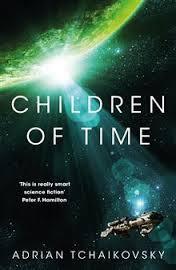Adrian Tchaikovsky's Blog, page 9
October 3, 2015
Dublin, Nottingham, Lightspeed!
Firstly, holy hell yes does the structure of this site need updating. That is being looked at.
Secondly, Bristolcon was a blast. I was on a really interesting, gritty panel on AIs that delivered (for me anyway) on an intellectual. I got to be the Prophet of Doom, which is a panel role I occasionally slip into when I feel we need a bad guy and nobody else is volunteering. "Do we need legislation about the rights of AIs?" asks the moderator. "Yes," say I. "How will we handle that?" "Badly." I glower at the audience as if to say "Come the revolution…" Muahahaha. Also at Bristolcon: many very fine authors, artists and the like, for it really is one of the largest and most bustling local conventions going. Paul Cornell recorded an episode of his podcast The Cornell Collective there, with Emma Newman, Jaine Fenn and Cavan Scott, so do go catch that. Ian Stewart (of Science of the Discworld fame) gave a talk on time travel. I even signed a satisfactory number of books (1). Good time was had by all.
But tempus is fugitting right now, if not on winged feet then on insect wings or a jetpack or something. Next weekend I am at Octocon in Dublin, and I will be doing this. In case that link is to some special private me-only page, "this" translates to:
Saturday October 10th — 10am "Bad Advice" panel (my speciality); 12pm "Writing RPGs" panel. I will also just be generally around and about from late Thursday evening until at least early afternoon on the Sunday, so please say hi, get me to sign things, convert me to lunatic religions (2).
Later on in the month I am Fantasycon (3) in Nottingham, the schedule of which can be found here. My personal globules of fun are:
Saturday 24th 2pm: "War: What Is It Good For? Martial Conflict in SFF" panel; Saturday 5pm - "Robots, Beasts & Humanimals: Writing Non-Human Characters" panel. I will also be reading not once but twice (!!1!) — on Friday at 7pm, and then again on Saturday at the Super-Relaxed Fantasy Club. The Friday slot will include the First Ever Excerpt from The Tiger and the Wolf along with a short story from an upcoming Fox Spirit antho. The SRFC section is only 5 minutes, so I'm still looking around for that (any requests?)
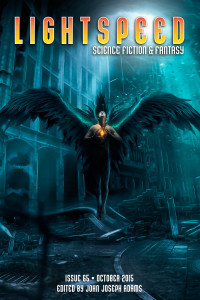 Finally, we accelerated to Lightspeed, meaning the Hugo-award winning magazine, issue 65 of which is very kindly publishing my new story "Children of Dagon". This is a SF piece and has very little, or indeed nothing, to do with HP Lovecraft.
Finally, we accelerated to Lightspeed, meaning the Hugo-award winning magazine, issue 65 of which is very kindly publishing my new story "Children of Dagon". This is a SF piece and has very little, or indeed nothing, to do with HP Lovecraft.
Although I may have some Lovecraftian news in the near future…
(1) i.e. at least one.
(2) please don't.
(3) or "Fantasycon 2015" as originally typed. But, let's face it, if later this month I was attending Fantasycon 2016, or 1994, or 2245, then I'd really have upped my game as a SF author.
September 6, 2015
Planet of the Updates
Busy busy, so just a few quick things as proof of concept that I'm still updating the blog.
Nine Worlds was ace. I've already booked for next year. I got to talk (and learn) about Doctor Who and books and stuff, and I had a very successful signing. I also got to give out the Morningstar Award at the Gemmels. Having misread the email I didn't realise until the morning of the ceremony that I'd have to do a speech, so had to hastily write one effectively on the back of a train ticket. But it turned out ok.
And I did a 9W blog already didn't I, so probably didn't need to say that. More haste, less speed.
I will be at Bristolcon on the 26th September at, um, Bristol. I have a panel talking about more human than human which I shall manfully try to make about spiders.
I am also at Octocon in Dublin, 9–11 October, and then at Fantasycon in Nottingham 23–15 October, and that, I think, is it for cons for this year.
I have, about 10 days ago, finished the first draft of The Bear and the Serpent, sequel to The Tiger and the Wolf. I am fast running out of dramatic animals. Stay tuned for The Weasel and the Lemur.
I have, today, finished off my novella for Abaddon's super-exciting project Monstrous Little Voices. This is a collection of 5 short linked pieces set in Shakespeare's 'world', and I am joined by Emma Newman, Kate Heartfield, Foz Meadows and Jonathan Barnes, overseen by the redoubtable(1) Dave Moore, who previously conjured me up for 221 Baker Streets and Journal of the Plague Year. My contribution to this new project goes under the title, 'Even in the Cannon's Mouth' and sees a hard-bitten band of combat veterans drawn from the comedies wash up on the shores of hostile Illyria.
Other projects are also underway, including some super secret short story stuff, but nothing firm enough to be nailed to the blog just yet.
(1) I, for one, have doubted him repeatedy.
August 16, 2015
Twenty Seven Worlds Have I Walked Thus Far
 "Aaaaand I have walked across Nine Worlds, and I have walked across Nine Worlds, just to be the man who walked across some worlds for no particular reason…"
"Aaaaand I have walked across Nine Worlds, and I have walked across Nine Worlds, just to be the man who walked across some worlds for no particular reason…"
So, yes" Nine Worlds 2015 is accomplished and (despite some wobbly organisation on occasion) has proved a worthy successor to the previous two. For sheer scope of content and clientele, I think it's just about my favourite convention going. I love the cosplay, which is plentiful and colourful and frankly a joy to behold. I love the variety of tracks and the variety of subjects covered within track. I got involved with the books and the Dr Who business, but there was also a wide range of stuff on Whedon, creative writing, films, comics and the like — way too much for me to see all the things I wanted to see. Which is preferable to the alternative.
The hotel was… ah, you know, there's no plastering over this one. The hotel as a structure was fine, though the turnout meant the rooms were a bit on the small side for the number of punters. The service was shockingly poor. It's been said elsewhere in greater detail, and the hotel has claimed this is because some sort of nebulous difficulty inherent in 9W punters, but my personal experience was that, no, it was slow and unwilling and below the standard you'd expect from an international hotel.
It might have been the lack of space that meant we were short some vendors this year, too — there was a nice sunday market of geeky goods, but other than that only Forbidden Planet and a games stockist had a permanent presence. Possibly if the venue changes to somewhere a bit more spacious for 2016 there might be a full-time vendor presence throughout.
But those were the only downsides, frankly. I did some panels, I saw some panels, I signed a pleasing number of books (Children of Time sold out at FP!) and met a very large number of old friends (and made some new ones including a very pleasant lady giving out chocolate cake in the "Only a Moment" queue (I believe Claire?) — please let me know if it was you, because that was very welcome). There was, as well as the aforementioned Only a Moment (Paul Cornell doing his usual bang-up job of hosting, with contestants Zen Cho, Joe Abercrombie, Marcus Gipps, Emma Vieceli and a late entry, new writer Chele Cooke who acquitted herself admirably (and was also dressed as the Winter Soldier, for an additional layer of awesome).
Nine Words 2016 is definitely going to be a thing, and I can highly recommend the experience, to experienced con-goers and especially to people looking to try a large convention but maybe a little worried about the reception they might receive — it's a tremendously friendly con, including special welcome events for newbies.
Share this
July 21, 2015
On the Edge of Nine Worlds
I've just got back from Edge-Lit (1), the Derby-based genre lit convention that seems to be going from strength to strength. I missed it last year owing to Loncon and general overconventionisation, but it had an enormous guest list and I got to catch up with all sorts of fun people. I did a panel on Is Grimdark Dead (2), another on Are We Already In the Future (3) and ran most of a workshop on world building, which was scary as hell because this time about half the audience was comprised of published authors. So, you know, how to suck eggs, really. But anyway…
I was also very flattered to be asked to guest on an episode of the Starburst Bookworm podcast (and I swear I was asked on the day, and it wasn't the wages of my last blog post) along with Jonathan Green, author and Fighting Fantasy impressario. I highly recommend checking out the recording, which is out now here.
Next up in a couple of weeks I have Nine Worlds, the great big Heathrow geekathon, and I have a few panels to announce:
I shall be Creating a Monster at 1.30 on Friday the 7th August along with Stark Holborn, Jen Williams, Rebecca Levene, David Monteith and Tom Fletcher. Being the enormous podcast fan that I am, very excited to meet David Monteith, who is always great fun on Geek Syndicate.
I shall then be mixing my SF with my fantasy at 3.15 on the same day, with Gaie Sebold, Zen Cho, James Smythe and James Oswald.
On Saturday I don my enormous scarf, fez, frock coat, trainers and terrible Scottish accent (4) for some Dr Who related business with:
At 1.30 I am discussing Peter Capaldi his life and times, although mostly times, and mostly as pertains to being a Time Lord, along with Duncan Lawie, Una McCormack and the redoubtable L. M. Myles
Shortly thereafter at 5pm I will be peering into the metal bowels of Dr Who and transhumanism along with Sarah Groenewegen, Paul Cornell and Una McCormack.
And that's my lot — hope to see you there.
(1) and boy are my… ah, forget it.
(2) No.
(3) No.
(4) My accent that is. I'm not impugning Peter Capaldi's for obvious reasons.
Share this
July 6, 2015
Return of the Pod People
Just a brief piece, as I am currently laid low with a severe case of the edits. I posted a while back about how I'd caught the podcast bug but good, and more recently went into some detail about Dissecting Worlds (whose espionage series has recently wrapped up). I have been expanding my reach into the podcast world, octopus like, and just wanted to throw up a few more I'd run into that are worth a listen.
 I'm just giving a go to the 2000AD Thrillcast (1), a relatively recent entry onto the podcast world, covering all things Thargoid or Dreddlike. I've not had a chance to listen to many, but I hear very good things.
I'm just giving a go to the 2000AD Thrillcast (1), a relatively recent entry onto the podcast world, covering all things Thargoid or Dreddlike. I've not had a chance to listen to many, but I hear very good things.
Also very new on the scene is The Cornell Collective. This is the brainchild of the multi-talented Paul Cornell, whose aim is to bring together the best of the worlds of TV, comic and novel writing in the comfort of your own ear. Which now sounds as if it's some sort of weirdly invasive parasite, but I promise you, it's not! Paul's first guests are Peter Harness (Jonathan Strange & Mr Norrell), Diana Rowland (White Trash Zombie) and Si Spurrier (most recently The Spire and Cry Havoc, but basically all the comics). I've just finished listening, and it's excellent.
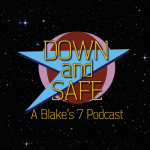 However, I am also very deeply in love with Down and Safe, which is a Blake's Seven cast tackling the series episode by episode, helmed by Michael Damien Thomas, LM Myles, Amal El-Mohtar and Scott Lynch (2). This is, basically, a hoot, approaching the series with the perfect combination of fondness and irreverence that it needs.Brian Blessed riding a giant bee! Paul Darrow's perfect face! Screeching mucus Ewoks! What more do you need?
However, I am also very deeply in love with Down and Safe, which is a Blake's Seven cast tackling the series episode by episode, helmed by Michael Damien Thomas, LM Myles, Amal El-Mohtar and Scott Lynch (2). This is, basically, a hoot, approaching the series with the perfect combination of fondness and irreverence that it needs.Brian Blessed riding a giant bee! Paul Darrow's perfect face! Screeching mucus Ewoks! What more do you need?
Finally for this round, I give you Meanwhile in the Future, a podcast by Rose Eveleth exploring Real Science through a little What If science fiction. Each week a fictional intro leads into discussion of what would happen if… a particular sci-fi (or sometimes not particularly sci-fi — see the ep on running out of antibiotics) future came to pass. The episodes are short and easily digestible, both entertaining and informative.
So: flying visit, edits beckon, more soon.
(1) Not, as originally typed, the 200AD Thrillcast, in which Judico Dreddus runs around shouting "Ego sum legem!"
(2) Yes, that Scott Lynch.
Share this
June 19, 2015
Other People's Trumpets part (x)
I have, I think, gone on about Children of Time (1) quite long enough. Suffice to say, it has had some lovely reviews, and I truly hope it does well. I release you, oh little spider, out the window of publishing!
Time to talk about some stuff I have been reading, that I think is rather good and deserves to be better known. My personal reading tastes value originality of concept in fantastical literature, and so here are a quartet of books which tick that box and are also, one and all, very enjoyable reads.
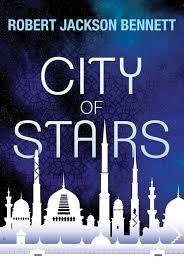 Firstly, let's talk about Robert Jackson Bennett, whom I had the pleasure of being on a panel with at Loncon 3, talking about the interrelation of magic and technology in fantasy. I have, far later than I should, got round to reading his City of Stairs, and I can report that it is both excellently written and enormously original — and thought-provoking. It also sits in a part of the fantastical morphogenetic space not a million miles away from Shadows of the Apt, and I rather think that my readers in particular might appreciate Bennett's world (and hopefully vice versa). The concept is that there were gods on the Continent, and they were both physically present and pretty much all-powerful, able to create fantastic creatures, raise buildings, prevent disease, transform people, all the usual. There was also a land called Saypur which had no gods to protect it, and this land was enslaved by the followers of the divine, and suffered greatly, until a hero arose and found a way to kill the gods. Which sounds pretty straightforward, good and evil-wise, but that's not the half of it. City of Stairs takes place many generations later, when the Continent is still trying to recover from the colossal blow of losing their gods — because most of the gods' works (including entire city districts) vanished when they died, and most of the rest was destroyed or suppressed by the Saypuri — and also, whilst the Saypuri had things like medicine, say, the people of the Continent had been used to divinely mandated health, and so plagues ravaged the land and devastated the population. And now the Continent struggles on under a Saypuri administration that expressly forbids any mention of or reference to the departed divinities, a prohibition strictly enforced by law. So the Saypuri are the bad guys…? Except the lost world of the gods was plainly rather horrible to be a part of — one of the gods was a mad Leviticus-style lawmaker, for example, savagely punishing any transgression of its meaningless tenets. Except the lost world was plainly rather wonderful too — living cities, enchanted items, all that jazz. Bennett conjures up a world that is very complex both historically and morally — he deals with religion, with race, with sexuality, and his style is enormously engaging.
Firstly, let's talk about Robert Jackson Bennett, whom I had the pleasure of being on a panel with at Loncon 3, talking about the interrelation of magic and technology in fantasy. I have, far later than I should, got round to reading his City of Stairs, and I can report that it is both excellently written and enormously original — and thought-provoking. It also sits in a part of the fantastical morphogenetic space not a million miles away from Shadows of the Apt, and I rather think that my readers in particular might appreciate Bennett's world (and hopefully vice versa). The concept is that there were gods on the Continent, and they were both physically present and pretty much all-powerful, able to create fantastic creatures, raise buildings, prevent disease, transform people, all the usual. There was also a land called Saypur which had no gods to protect it, and this land was enslaved by the followers of the divine, and suffered greatly, until a hero arose and found a way to kill the gods. Which sounds pretty straightforward, good and evil-wise, but that's not the half of it. City of Stairs takes place many generations later, when the Continent is still trying to recover from the colossal blow of losing their gods — because most of the gods' works (including entire city districts) vanished when they died, and most of the rest was destroyed or suppressed by the Saypuri — and also, whilst the Saypuri had things like medicine, say, the people of the Continent had been used to divinely mandated health, and so plagues ravaged the land and devastated the population. And now the Continent struggles on under a Saypuri administration that expressly forbids any mention of or reference to the departed divinities, a prohibition strictly enforced by law. So the Saypuri are the bad guys…? Except the lost world of the gods was plainly rather horrible to be a part of — one of the gods was a mad Leviticus-style lawmaker, for example, savagely punishing any transgression of its meaningless tenets. Except the lost world was plainly rather wonderful too — living cities, enchanted items, all that jazz. Bennett conjures up a world that is very complex both historically and morally — he deals with religion, with race, with sexuality, and his style is enormously engaging.
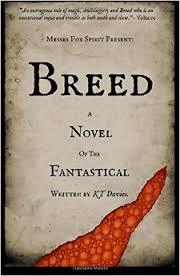 Next up: Breed by KT Davies. I was enormously impressed by KT's heroic fantasy The Red Knight, which came out a while ago. Breed is a very different beast, and I think I like it even better. It's a fantasy about thieves, in the Lieber-Lynch-Tallerman-Hulick sense, but in a high-magic, high humour way — it's not an out-and-out comedy in the Pratchett vein, but the titular first-person narrator has a cheerfully pragmatic tone that's easy to laugh along with, even when things are going extremely badly for the larcenous hero(/ine — as Breed is never actually gendered). Breed is a half-human rogue in a word replete with dragons, demons, magicians and non-human races — the setting really is good old fantasy, but with a lot of the tropes turned upside down and inside out. The book rattles along at top speed as the protagonist sprints through robberies, escapes, botched assassinations, more escapes, rival sects of magical monks, demonic influence, yet more escapes, political intrigue and, my personal favourite, a mosquito-man dandy and sharpshooter. Breed is a swift, fun read in a light, pulpy style that you don't get all that much of in fantasy, and hopefully there will be more of the rogue's adventures from Davies at some point down the line.
Next up: Breed by KT Davies. I was enormously impressed by KT's heroic fantasy The Red Knight, which came out a while ago. Breed is a very different beast, and I think I like it even better. It's a fantasy about thieves, in the Lieber-Lynch-Tallerman-Hulick sense, but in a high-magic, high humour way — it's not an out-and-out comedy in the Pratchett vein, but the titular first-person narrator has a cheerfully pragmatic tone that's easy to laugh along with, even when things are going extremely badly for the larcenous hero(/ine — as Breed is never actually gendered). Breed is a half-human rogue in a word replete with dragons, demons, magicians and non-human races — the setting really is good old fantasy, but with a lot of the tropes turned upside down and inside out. The book rattles along at top speed as the protagonist sprints through robberies, escapes, botched assassinations, more escapes, rival sects of magical monks, demonic influence, yet more escapes, political intrigue and, my personal favourite, a mosquito-man dandy and sharpshooter. Breed is a swift, fun read in a light, pulpy style that you don't get all that much of in fantasy, and hopefully there will be more of the rogue's adventures from Davies at some point down the line.
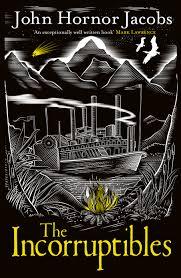 John Horner Jacobs was another American visitor I met last year — at Nine Worlds in fact, where he provided the appropriate accent for a character in Stark Holborn's reading of her Nunslinger. Appropriately enough, Jacobs is also a western writer, of a kind. The Incorruptibles is a tale of the fantastic West as seen through a distorted alt-history lens. The sort-of New World has been colonised by an updated Roman Empire fuelled by an industry that runs on demons — even down to the individual bullets in a gun. Jacobs takes, breaks and reforges various fantasy staples — his dwarves are a subjugated race, slaves and servants to the Romans (the narrator is one such, serving as 'native tracker' for them) while the elves are terrifying elemental forces — murderous and hostile and almost impossible to kill. Throw in Roman foreign policy, the terrible trade of the demon-binding engineers and a traditionally stoic gunfighter, and it's a very enjoyable book, definitely one I'll be grabbing the sequel to.
John Horner Jacobs was another American visitor I met last year — at Nine Worlds in fact, where he provided the appropriate accent for a character in Stark Holborn's reading of her Nunslinger. Appropriately enough, Jacobs is also a western writer, of a kind. The Incorruptibles is a tale of the fantastic West as seen through a distorted alt-history lens. The sort-of New World has been colonised by an updated Roman Empire fuelled by an industry that runs on demons — even down to the individual bullets in a gun. Jacobs takes, breaks and reforges various fantasy staples — his dwarves are a subjugated race, slaves and servants to the Romans (the narrator is one such, serving as 'native tracker' for them) while the elves are terrifying elemental forces — murderous and hostile and almost impossible to kill. Throw in Roman foreign policy, the terrible trade of the demon-binding engineers and a traditionally stoic gunfighter, and it's a very enjoyable book, definitely one I'll be grabbing the sequel to.
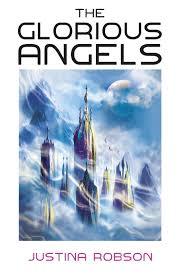 Finally, The Glorious Angels by Justina Robson. This is more of a SF book, but SF written in the fantastical style like Wolfe's Book of the New Sun. Robson gives us a world of vast mobile cities ruled by mindlinked empresses, a female-led society full of political machinations, technology bound to individual bloodlines (and at that point the reader begins to realise that some very weird stuff lies in the past to have led to this society), and a war with the enigmatic, non-human Karoo over an archaeological treasure trove that turns out to be far more than anyone has bargained for. The joy of Angels — aside from Robson's always-elegant style — is the complexity of the society and its characters, which are beautifully realised and give us a kaleidoscope of viewpoints and relationships, a richness that spec fic often fails to yield. I particularly like the Karoo, because while they are extremely alien, in what they are, what they look like, and especially what they want, we also get one as a POV character, and Robson is a master at making the inhuman comprehensible to a human reader.
Finally, The Glorious Angels by Justina Robson. This is more of a SF book, but SF written in the fantastical style like Wolfe's Book of the New Sun. Robson gives us a world of vast mobile cities ruled by mindlinked empresses, a female-led society full of political machinations, technology bound to individual bloodlines (and at that point the reader begins to realise that some very weird stuff lies in the past to have led to this society), and a war with the enigmatic, non-human Karoo over an archaeological treasure trove that turns out to be far more than anyone has bargained for. The joy of Angels — aside from Robson's always-elegant style — is the complexity of the society and its characters, which are beautifully realised and give us a kaleidoscope of viewpoints and relationships, a richness that spec fic often fails to yield. I particularly like the Karoo, because while they are extremely alien, in what they are, what they look like, and especially what they want, we also get one as a POV character, and Robson is a master at making the inhuman comprehensible to a human reader.
(1) Available from all good bookshops. And some frankly rather seedy ones.
Share this
June 5, 2015
Will No One Think of the Children (of Time)?
Or, as originally typed, of Tim. No idea what a book called Children of Tim would be like. Possibly a generational sequel to The Tim Machine and A Dance to the Music of Tim.
Children of Time is out! Not with a bang but a scuttle of little arachnid feet.
If you're interested in some actors I think should play the leads in any film of Children of Time then you should click here, but only after remembering what a terrible person I am.
The first reviews are in, so if you're sitting on the fence about the book (1) then I am very happy to say it's had some cracking reviews.
Also, as usual, I've been guest posting it about the place. You've hopefully read and enjoyed the little prequel pieces on this site, but you may also like:
Home Sweet Home : Generation ships and failed space colonies, a brief look at some of my favourites (tor.com)
On the Origin of Portiids : a look at speculative evolution and how I came up with the inhabitants of Kern's World (sfbook.com).
Human, Near Human, Non-human : writing the monster as character (basically last year's favourite con panel topic) (a dribble of ink).
10 Things to Take With You When Starting an Extrasolar Colony : Because if you don't start packing now, it'll be too late (fantastical librarian).
Finally, Spiders in Space (2), an interview over on Tor UK's site.
(1) If you're a regular reader of the blog, and sitting on the fence about the books, then that just goes to show what a terrible internet communicator I am.
(2) OK not actually called that, but not for want of trying.
Share this
June 2, 2015
Children of Time vignette 6: Trespassers in Eden
Last little slice before the official release date, and if you were asking, "What's all this human stuff? I thought the book was about aliens!" then this is the most I can possibly say without spoilers. Enjoy!
Another Earth.
They were working on this place when the bomb went off in Reykjavik, putting the finishing touches to a biosphere imported from earth. A big job, but the planet was perfect for it, the first of a long string of islands in the great empty night. The dream project of a misanthropic genius transhumanist, who planned to make it her grand experiment.
When everything fell apart, when the colonies on Mars and Europa and all the others died, when the signals from Earth ceased, this other Earth circled its far-distant other sun with blithe unconcern. The genius behind it never got to run her experiment. Something else happened instead, something unplanned for, unexpected, unwanted.
All the while, when the tough remnants of the human race lived in the shadow of the ice and dragged themselves back into an understanding of themselves, something else was breeding and growing on this world, a usurper in this human paradise. Not an experiment, barely a mistake, just an unintended side-effect of how things fell out.
And one day, while mankind regrouped on its poison Earth, other eyes looked up at the sky and asked Why? and Where did we come from? They looked at the pinprick lights above them and wondered why one moved so swiftly across the sky, never realizing that they were looking at all that was left of their creators.
From something that merely bred and fed, they became something that remembers and builds and dances and thinks. They told their own stories in their own language.
They cannot know that their creators are coming back to haunt them. They cannot know that sometimes, Where did we come from? is the worst question of all.
Share this
June 1, 2015
Children of Time vignette 5: Voyage to Nowhere
Meet Vrie Guyen: your life in his hands.
You wake in darkness, enclosed. Something is forcing its way into your mouth, down your throat. Something is clamped about your nose. Things are invading you. You fight; you can’t fight: you are restrained. Then something gives; your arm clutches towards your face but strikes a cold, hard surface right before you… above you… you cannot tell. You cannot tell which way is up.
Your hand slithers up the inside of the cold surface until it is at your mouth. Tubes, there are tubes. You wrench them out. You stare into the darkness until the lights come on.
They are soft lights, originating from somewhere behind your head. Probably they are intended to be comforting. You are not comforted.
The barrier before you is clear. Looking out of it you see… ranks of clear-fronted coffins in a great dark space. At first you think they are reflections, but all the others of you are asleep, their tubes still plugged into nose and mouth.
You have no idea where you are. You yell. You bang at the clear plastic. It is colder than it was.
There is a voice, a man’s voice.
“Can you hear me?” it says.
You listen. It repeats itself. The voice sounds patient, sad.
“Yes,” you whisper into the tiny coffin that is your world. “I hear you. Who are you?”
“Do you know where you are?” asks the voice, leaving you uncertain whether it’s owner can hear you.
You open your mouth to say, and there is a hole in your mind, a great yawning gulf where the knowledge should be. You do not know where you are. You do not know who you are. Your sense of self is a string of disjointed images: the sun, parents, a brown landscape, the harsh taste of the air.
“Listen to me,” says the voice. “You are on the Gilgamesh. The Gilgamesh is a colony ship. Do you remember.”
You know the name, but it’s like someone you met a long time ago. You can’t place it. You try to understand what the voice means. A colony ship…?
The voice continues with its dreadful, didactic patience. “The Gilgamesh is on a journey to another world, do you understand that?”
And you do. When the information abruptly flowers in your mind you feel like weeping. You are coming back to yourself. You are more than these broken fragments. “Yes,” you say, and “Yes!”
“We have star maps from the Old Empire,” the voice confides to you – things you think you knew once, fitting into place like bricks, one on another. “We are humanity, in this ship. We are on a long journey to a planet that we believe the ancients made into another Earth. But an unspoiled Earth, one not poisoned by their war.” There is a terrible, wistful yearning in that voice.
“Who are you?” you demand. If not for that yearning you might have taken it for some thinking computer, such as the ancients were supposed to have.
“My name is Vrie Guyen. I am the Gilgamesh’s commander. Right now I’m the only member of Key Crew not in suspension. You and I are the only two human beings awake.”
And you think about that, and you know it must be an honour that they’ve woken you first. You and the commander, of all those sleeping people outside your coffin. “Commander,” you say, “how long before we’re on this new Earth?”
Guyen’s voice says nothing for long time.
“Commander?” you prompt him, and then again. And then again.
“If it is there,” says Guyen’s disembodied voice, “then the Gilgamesh will reach it in approximately twelve-hundred years. Our ships cannot travel as the ancients travelled. We have only a shadow of their technology, their resources…'
You do not understand. Guyen does not volunteer an explanation. You cannot even think of how to phrase the question. The silence stretches out, and it’s getting colder.
“You see,” the commander tells you eventually, after listening to your teeth chatter, “you are the first.”
“The first to wake.” You can barely get out the words.
“The first cargo malfunction,” Guyen tells you. The words mean nothing. You turn them over in your mind. Still nothing. Then, as though a visual illusion has just flipped before your eyes, you understand.
“We knew this would happen with a proportion of the cargo over the time periods involved,” Guyen goes on, and you wish he would just shut up but you have no way to make him. “I had the Gilgamesh wake me, when it did. You are the first. I felt I owed it to you.” And, perhaps because his voice is all you have, you can hear the ragged edges there: the man who is responsible for everything.
You try to say something. Guyen will never know what your final message to him would have been.
“I’m sorry,” he says.
The lights go out.
Share this
May 31, 2015
Children of Time vignette 4: Tomb Raiders
Fast forward to a brave new world!
When the impact came it nearly took Arkin from his feet, for all he was clinging to the airlock handholds. He had his helmet on already, waiting for the alarms to tell him they had a hull breach. Or perhaps they were still intact, but now attached inextricably to the ancient space station, about to explore this brittle treasure trove only to discover that there was no way back.
“We have a seal,” Serry Lain’s voice came in his ear.
“Orbit?” This from their leader, Channec, clinging on next to Arkin.
“Too soon to tell. If we have knocked it loose, it’s only by a little. You’ve got time to get in and out,” Lain reported. Her voice was fizzy with static, ghosting with sudden tides of white noise. The sound brought both wonder and wariness to Arkin. Interference like that meant something was live on the station, after so many, many years.
Live meant worth salvaging. Salvage was why they were here.
Some time long before, a distant ancestor of Arkin had looked up past the thinning clouds and seen the night sky full of stars. The ice had been retreating; the dust of ages had finally settled out of the upper atmosphere, letting the sun take a renewed interest in the planet. Geothermal fires, brought close to the surface by the ice’s own creeping weight, did the rest. Summer returned to Planet Earth, and with it a chance to stargaze.
Even back then, as proto-Arkin tilled his fields and hoped the raiders wouldn’t come this year, he would have noticed how many of the stars moved swiftly across the sky. Old Farmer Arkin couldn’t have known what they were; he couldn’t have known that his distant descendant would travel by thunderous blazing rocket up to those stars, to become a raider himself.
“Check your lid,” Channec said, all business and clasping her own helmet into place. They were piecemeal, these suits. Arkin was uncomfortably aware that two people had died in his before they had patched it up once more and given it to him. But everything was scarce, back home. The great wealth of the Old Empire people had been mined, drilled, burned up, squandered back in their day. Arkin’s people lived on a planet scattered with their leavings.
Almost everything we have is a hand-me-down, he thought, not for the first time. They were here in a rocket that was a child’s crude sketch of the beautiful vessels the ancients had built. They were here because a classicist – meaning someone skilled in interpreting Old Empire writings – had discovered something about this orbiting hulk the ancients had left to the vacuum of space. We’re just ticks on their dead body.
But he had his helmet on. No doubt Channec would say people back home were counting on him.
“Air out,” Channec ordered, and Lain confirmed. Arkin felt his suit bulk out around him, waiting to see if any warning lights would come on this time. Of course, if they didn’t, it might just mean the warning systems had malfunctioned as well.
“Let’s get in there.”
Arkin wound the handle and the airlock hatch juddered open. He checked the seal, finding just enough holes to make him unhappy. Facing them was a pitted section of metal wall, holed through at two or three places. Channec nodded to him and they began the tentative, painstaking job of breaking through.
“I’m detecting low-level power readings,” Lain’s half-obscured voice informed them. “We’re knocking on the right door.”
A section of the station wall suddenly came free in Arkin’s shears and he toppled forward with a cry. For a moment he lost all reference, the universe wheeling freely around him. He was horribly aware of the jagged edges of his incision, the ballooning fabric of his suit, the airless, unpressurised death all around him.
Channec snagged his boot, and for a moment he was just a frozen weight on the end of her arm, already crossed over the threshold into the territory of the ancients.
“Get a grip,” came her sharp voice in his ear, with her own backing of static now, and he managed to orient himself and find something to hold onto.
He looked and nearly swallowed his tongue. He was sharing the compartment with a corpse.
The ancient had died without a suit on, just clothes that looked pale and papery. He – she? – drifted there like one of the drowned, slowly turning, withered to a dry-stick figure, skin brittle and tight over bone. The ends of all four outflung limbs were broken off by collisions with the walls. Arkin’s eyes tracked a lone, mummified finger as it spun slowly past his visor.
“Stop gawping,” Channec told him. “It’s not like it’s your first.”
“Ah…” Lain was hard to make out. “Getting increased power sig… …ever you’re going to do… quick.…”
“We don’t even know what we’re going to do,” Arkin muttered.
“Just come with me,” Channec told him. She shouldered forwards, batting the vacuum-dried corpse out of the way as though it were no more than a bad dream.
“What? What do you know? What did they give you?” Arkin thought of that classisist, sitting safe at home on Earth while they risked their lives on a hunch.
“Enough.” Channec pulled herself forwards – zero gravity was like second nature to her; she seemed to swim through the airless spaces of the station while Arkin blundered along behind.
They found more shrivelled revenants: some buckled in as though a little webbing would save them, others floating loose like ghastly bobbing apples. Channec had no time for them, shoving them aside so that they span end over end, colliding with the walls or with Arkin. He could feel a sickness creeping up inside him: he had seen the occasional space-dead corpse before, but when this station powered down it must have had twenty or more souls aboard it. His mind was full of their last moments, as imagined by their distant, distant descendant. They had been the ancients. They had walked the stars and commanded the elements with a science that might as well be magic for all Arkin understood most of it. And yet they had died.
“Here.” Channec had stopped at a half-open hatch. Beyond was a room walled with screens and the minimalist consoles the ancients favoured. Everything had been done for them by their machines, Arkin knew. They had not needed the buttons and levers and instruments of the crude rocket that had brought the salvage team up into orbit. Their civilization had been ghostly, transcending the physical.
But by trial and error, Arkin’s people had learned how to pirate some few scraps of that world: reviving long-dead electronic libraries just long enough to steal a book or two, pirating from the memories of lobotomised computers. Just enough to recreate a fraction of the wonders of the ancients.
Lain said something over the comms, but they heard nothing except static.
“’Here’ what?” Arkin demanded, but Channec was orienting herself, choosing one featureless console over the others. She bent over it, thick-gloved hands moving carefully as she unhooked something from her belt: a reader.
“How do you know there’s anything?” he demanded, but she ignored him.
He swept his torch beam across the room and felt his gorge rise another inch when he found two bodies up against the ceiling. These were wearing suits: one had no helmet, the exposed head no more than parched skin stretched over an eyeless skull. The other had its helmet on, and Arkin imagined that one ancient living out some few additional hours until the suit’s air supply was exhausted. Had they railed against their doom? Had they desperately tried to reactivate the dead consoles to hear another human voice before the end?
Then the lights came on, throwing their shadows, Arkin's and Channec's and the corpses', into sharp relief against the walls. Something was glittering over the console.
Arkin stared. Stars; he saw stars. They glittered and span in the air around Channec. He saw her head tilted back inside her helmet, her hard-bitten expression transformed to childlike wonder.
“It’s here!” Over the comms, her voice crackled and spat, the static ghosting louder like a heartbeat. “This is the motherlode!”
“What is it?” He couldn’t take his eyes from the display.
“Maps, maps of where the ancients went!” Channec explained. “The worlds they visited, the new homes they made for themselves amongst the stars. Worlds that aren’t neck deep in poisons, Arkin.”
He felt something catch at his throat, and then the comms roared with a new voice.
It was four times as loud as Channec had been. It spoke with the irregular heartbeat of the static, and in a language that had no native speakers left alive. Stern and pitiless it exhorted them to do something. Leave, Arkin decided. Red sigils were appearing in the air, flickering and corrupt, but definitely bad.
“It’s still alive!” he yelled, but there was no chance of anyone hearing him while that artificial voice dominated comms.
Channec was focused on the reader, willing it to speed up its download. Who knew what would actually be readable, of the pittance they could carry away. But he had seen the stars now. He knew what was at stake.
The virtual starfield wheeled about him, ancient numbers and alphabets projected across his visor and his suit, and the shadows moved too.
He saw it too late: the shadows moved more than the lights.
The suited figure was drifting down from the ceiling. Within its helmet Arkin saw a death’s head shift loosely as the suit’s ancient mechanisms propelled it towards Channec.
He yelled; he yelled at her, and tried to bumble his way towards her, but already too late. One gloved, dead hand snagged the hoses of her suit.
Channec twitched and flailed, unable to see what had her. Arkin bounced off the consoles, spun through the stuttering red glyphs, groping for purchase. When his view brought him Channec again, she had smashed the ancient suit’s faceplate in with something, but of course the wasted cadaver within was not directing its movements. He saw its armoured gloves clamp to her own helmet. His screaming voice was loud in his own ears, and in his ears alone.
With a convulsive movement Channec wrenched the reader from the console and shoved it at him, even as he reached her. Her helmet was askew. He caught a last view of her determined face.
She got the reader clamped to his belt and kicked him in the chest, sending him hurling back the way they had come, sending herself and the homicidal suit spinning off across the room. Before they reached the far wall, he saw her helmet come loose.
Whimpering and panting, surrounded by the sounds of his own exertion, he fumbled and scrabbled his way back towards Lain and their ship, desperate to escape this orbital mausoleum with the inestimable treasure Channec had died for.
Share this

